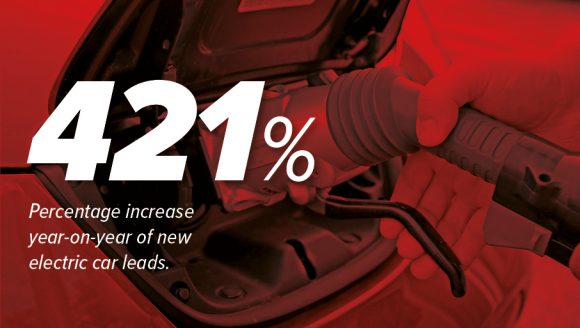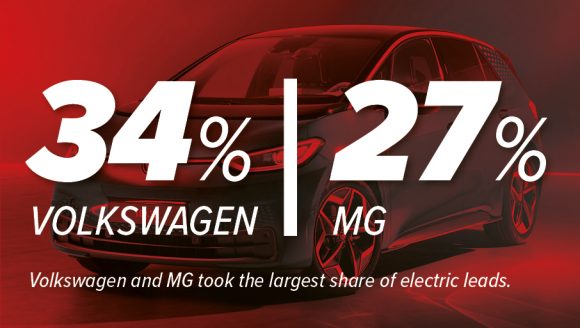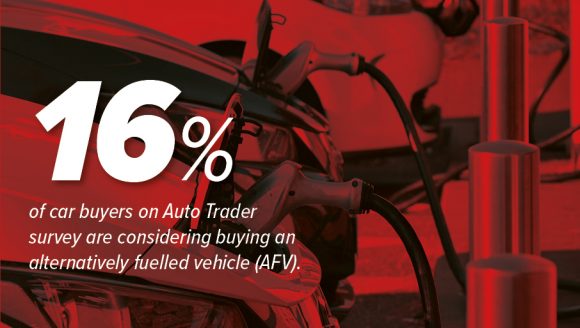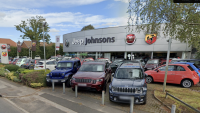The electric car revolution has well and truly begun following the government’s announcement to bring forward the date to ban petrol and diesel cars to 2030.
Car dealers across the country have seen a steady rise in enquiries from customers looking to change to electric vehicles in the days since the ban was unveiled.
A combination of a heightened feeling of environmental responsibility and a desire to save money – coupled with buyers having more time on their hands to research EVs properly – has led to dealers seeing a rise in demand since the pandemic too.
Auto Trader’s latest data reveals a noticeable spike in engagement with electric vehicles on its website.
Advert views for electric cars soared 124 per cent the day after the Prime Minister Boris Johnson announced the 2030 change.

Leads sent to dealers selling electric cars have also been shocked into action – up 421 per cent year on year.
Car dealerships are seeing this increased interest translate into enquiries.
Peter Cooper Volkswagen brand manager Craig Clapham told Car Dealer that the pandemic had ‘given people more time’ to research electric cars.
The dealership has recently started selling the electric ID.3.
He told Car Dealer: ‘This time, I think people generally were and are looking at ways they can cut their expenses, as well as trying to future proof themselves. And I think that’s where an EV comes in – if you’re going to go electric, now’s the time.
‘Some are doing it to save money, but also there’s lots of people considering whether they need two cars and when they’re doing less mileage an electric car fits the bill.’
Clapham has certainly seen an increased interest in Volkswagen’s EV range thanks to the ID.3.
He added: ‘The consumer is thinking now’s the time to consider one of our EVs, given the information that’s been given by the government.’
Other franchised dealers are seeing similar boosts in demand.
Adam Walsh, general sales manager of Guildford-based Richmond Hyundai and MG – said there’s been significant interest in the electric MG ZS.
He said: ‘In terms of our new MG product – probably in the region of 60 to 70 per cent of what we’ve been selling has been electric.

‘Mainly it’s around the price. It is a lot cheaper than the Hyundai Kona Electric and interest has definitely skyrocketed.
‘On the Hyundai side, we’ve seen a slight increase in Kona Electric sales – though not as much as we would have liked.’
Interestingly, Auto Trader said Volkswagen and MG took the largest share of the leads it sent to dealers and by some margin, receiving 34 per cent and 27 per cent respectively. They were followed by Kia (7%), Audi (6%), Nissan (6%) and Jaguar (3%).
On the day of the 2030 announcement other websites saw similar bumps in traffic.
What Car? told Car Dealer that they saw a 308 per cent rise in visits to electric car pages as a result of the ban.
That has now tapered off, but is still 43 per cent up on the days before the announcement.
Editorial director Jim Holder said: ‘For many years we’ve seen exponential growth in our best electric cars stories, but what I think has changed in 2020 is the move from people researching this to then going through it to actually consider a purchase.’
Independents
Independent used electric car dealers are seeing similar interest surges in electric cars.
James Guthrie runs We Are EV, a specialist in electric cars, founded in 2017. He stocks around 15 fully electric cars at his Bristol site.
He said: ‘What has had a positive impact on EV interest is the reduction in air pollution – the drop in carbon dioxide – from people travelling less during the pandemic.
‘I think that’s brought more attention to the fact that petrol and diesel vehicles do have an effect on the air quality. And I think even though people already knew they did, it wasn’t as apparent until everything stopped.’
In London during the first UK coronavirus lockdown the city’s CO2 emissions was cut by close to 60 per cent.
Richard Symons, founder of another EV specialist, R Symons, agrees the drop in pollution has ‘opened the public’s eyes’ to what a less polluted world would look like.
He told Car Dealer: ‘Nothing other than the pandemic could have made such an immediate impact and scientifically prove, straight away, the difference transport and industry makes to pollution.
‘We could see the change with many visual pollution charts and it hopefully helped create motivation to keep some of that reduction going.
‘EV sales are always rising, new and used, which is down to continued awareness, education, visibility and word of mouth. Most people who own an EV wouldn’t want to go back to combustion.
‘Coronavirus helped us with a glimpse of how CO2 emissions can fall vastly with less combustion cars on the road, so that accelerated interest, but the demand has been growing over the last five years anyway.’

Adapting
We Are EV’s Guthrie advises dealers to get clued up on electric vehicles and how they work because buyers need help and expertise when choosing a battery-powered car.
He added: ‘We tend to find that our customers are happy with our service because we know everything about the cars and everything about the charging.’
While there are plenty of specialist green car dealers helping customers choose, there are still some dealers who are reluctant to make the leap.
Lyons Farm cars, based in Horsham, has been open trading since 2004, and currently has two hybrid cars in stock. A spokesperson told us they weren’t ready to fully commit ‘just yet’.
The spokesperson added: ‘For us, electric cars are slow burners – we’re hearing the same old thing about the charging infrastructure not being there and people still have range anxiety too.
‘We get a lot of hybrids in and we have no trouble shifting those – the Mitsubishi Outlander is a big seller for us, although we’ve not been able to get many this year.
‘It’s just fully electric cars – we haven’t touched one in a couple of years now.’
Accelerate
What is clear is that the electric car surge is likely to continue – and accelerate as we get closer to the 2030 ban.
EV dealer Symons said the growth seen since the pandemic was likely to be just the start.
He added: ‘Why wouldn’t you want to try and switch?
‘There really are not many valid arguments against it for a large part of the population. We just need a few more facilities put in place such as more workplace chargers.’
Guthrie added: ‘I expect this rate of uptake to continue. The cars work and the technology is really getting there now.
‘Even post-pandemic and as time goes on, the technology will improve, the cost will come down and more people will want EVs.’
Auto Trader’s commercial director Ian Plummer said the government’s plan to ban petrol and diesel by 2030 was ‘commendable, but ambitious’, especially considering that while buyers are considering electric vehicles, the conversion rates are still poor.
He added: ‘While the data highlights a significant growth in EV demand, boosted by the prime minister’s announcement, conversion from consideration to purchase remains low, and a long way off from what’s necessary to achieve the 2030 target.
‘Environmental concerns are increasing, but price remains the primary driver of adoption, and beyond much needed government incentives, the onus will be on retailers and manufacturers to make the switch from internal combustion engines feel more affordable.’
Additional reporting: James Baggott
- Register as a Car Dealer member and get more out of the website here
- Car Dealer Mag issue 153 is out now – Read it here
- Join our breaking news WhatsApp group – Click here to join now































